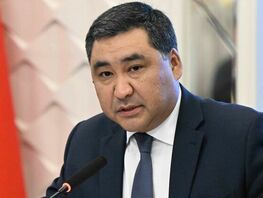A multilateral dialogue «Combating Transport-Related Air Pollution in Kyrgyzstan: Towards Clean Air in Cities All Year Round» was held in Bishkek. The event was opened by Meder Mashiev, Minister of Natural Resources, Environment, and Technical Supervision.
According to the minister, transport pollution has become one of the key causes of deteriorating air quality in cities. While previously the focus was on the heating season, recent studies by the World Bank and UNEP have shown that transport significantly contributes to pollution—both in summer and winter.
According to the ministry, by 2024, there were 1,674,085 registered vehicles in the country, 83 percent of which are older than 15 years. In the capital, 426,946 vehicles are registered, of which 333,801 are also older than 15 years.
According to the City Hall, over 750,000 vehicles travel daily in Bishkek, while the road capacity is approximately 350,000. This significantly exceeds the permissible load on the transport infrastructure.
The minister emphasized that low-quality fuel and limited alternatives to personal transport make air pollution a systemic problem requiring comprehensive measures. He recalled that, in accordance with President Sadyr Japarov’s decree «On measures to ensure environmental safety and climate resilience in the Kyrgyz Republic,» specific steps are being taken to improve the environment.
A new interdepartmental commission on air quality improvement has also been formed, including representatives from 25 ministries and agencies, as well as eight members of the Zhogorku Kenesh. The commission is conducting comprehensive work to reduce air pollution and develop a systemic approach to addressing environmental issues.
Meder Mashiev outlined a number of practical measures already being implemented in the country:
- Transition to eco-friendly transport. More than 1,300 eco-friendly buses and 120 electric buses have arrived in Bishkek, reducing diesel fuel consumption by 100 tons per day. 1,014 buses operate daily. In 2024, 3,535 electric vehicles were registered, and 44 charging stations were installed.
- Improving the monitoring system. Together with the Hydrometeorological Service, with support from the World Bank, 11 automatic charging stations are being modernized in Bishkek, Osh, Kara-Balta, Tokmak, and Cholpon-Ata, and eight manual and semi-automated stations are being upgraded.
- Updating the regulatory framework aimed at improving emission regulation and control.
«Today’s dialogue is another step in our consistent work. We intend to take concrete actions aimed at reducing transport emissions not only in Bishkek, but also in Osh, Manas, and other major cities of the republic,» the head of the Ministry of Natural Resources said.
Air pollution in Bishkek is recognized as one of the most pressing environmental challenges. According to international organizations, the transport sector contributes significantly to the capital’s emissions. Authorities previously announced their intention to develop eco-friendly public transport and an air quality monitoring system.






